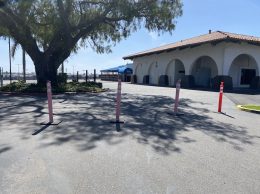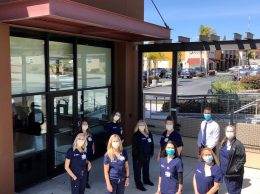Questions remain as the Small Business Administration ran out of funding for the Payroll Protection Program on April 16.
The fund started with $349 billion, which was quickly loaned out to businesses across the nation — but not to everyone at the same time. Independent contractors and self-employed people were able to apply for the program for the first time on April 10, a week after other businesses started applying.
This meant a second wave of applications for a system that was already overloaded, but it was a wave that some banks were prepared for, according to Michael Pfau.
Pfau, a lawyer who helps business owners with issues like real estate deals, debt financing transactions and tax-deferred exchanges, is sending regular emails to his clients with updates about the PPP. Pfau was previously part of the board of directors for the Pacific Premier Bank, but stepped down about a year ago, and he uses his contacts in the industry to help explain some of the changes and updates he’s writing about.
“It’s a program that was enacted with the best of intentions, and they rolled it out as quickly as possible with the depth of the crisis,” Pfau said, “but this has not been successful yet.”
Pfau has been fielding hundreds of questions from clients concerning eligibility, what’s required and how much businesses can apply for. A lot of small businesses are limited liability corporations, so there were questions over whether or not owners can put themselves on their loans.
The questions make an already-difficult situation worse. Pfau pointed to small businesses as bearing the brunt of the crisis, and problems like website issues and late rule changes from the SBA only compounded problems.
“It’s frustrating,” Pfau said. “There are a lot of people who have been really hurt by this.”
Smaller banks have started funding some of the initial loans, but problems come in for clients of bigger, national banks, where some business owners haven’t even been able to get through to someone to find out the status of their applications. Additionally, most business owners are not used to reading federal guidance forms, so many of Pfau’s clients have reached out to him for advice.
CoastHills Credit Union is one of the smaller financial institutions in the area which is working with members to get funding for small businesses as soon as possible. CEO Paul Cook said the bank has gotten more than 500 applications, and has applied for almost $24 million in funding from the SBA.
“It’s an easy process,” Cook said, “but there’s a lot of paperwork.”
The credit union is dedicated to helping everyone in the community, not just the people who are already members. Because of that, Cook said the credit union is accepting applications from everyone, regardless of whether or not they were a member before the crisis hit.
“The federal government made this program available,” Cook said. “It should be available for everyone.”
In order to get a PPP loan through CoastHills Credit Union, though, people have to open deposit accounts.
“We’re excited to get to know people and have more membership,” Cook said.
This comes at a time when other institutions, including local banks, have restricted PPP access to business owners who were with them before a certain date. Additionally, while some banks have reopened their applications, others like Montecito Bank & Trust and American Riviera Bank were still sorting through the initial burst of applications they got from the first wave, and hadn’t yet reopened their process to the second round of applicants as of press time.
As funding for PPP loans has run dry, people who are still waiting to hear back about the status of their loans might have to wait a little longer for a capital boost. Still, officials from Montecito Bank & Trust are confident a second wave of funding will get approval from Congress, which will give businesses who didn’t get in on the first wave another chance.
In addition to help through the SBA, local organizations like the Economic Development Collaborative are stepping up to help out. While the EDC’s loans aren’t forgivable in the way the SBA’s loans are, the EDC’s Disaster Loan Funds are available for businesses who need help in ways the PPP loans might not cover. Women’s Economic Ventures is also offering a quick response loan that, like the EDC’s option, isn’t forgivable, but is available for businesses who need alternate forms of help.
• Contact Amber Hair at ahair@pacbiztimes.com.






 Print
Print Email
Email

















